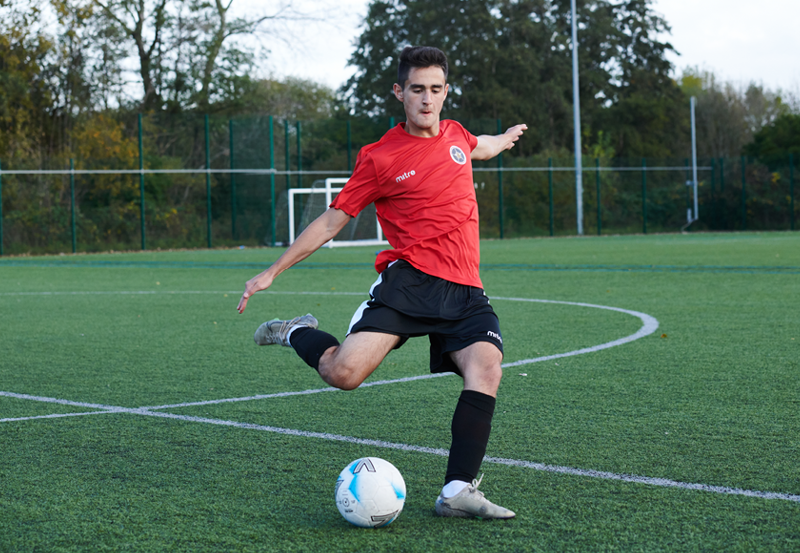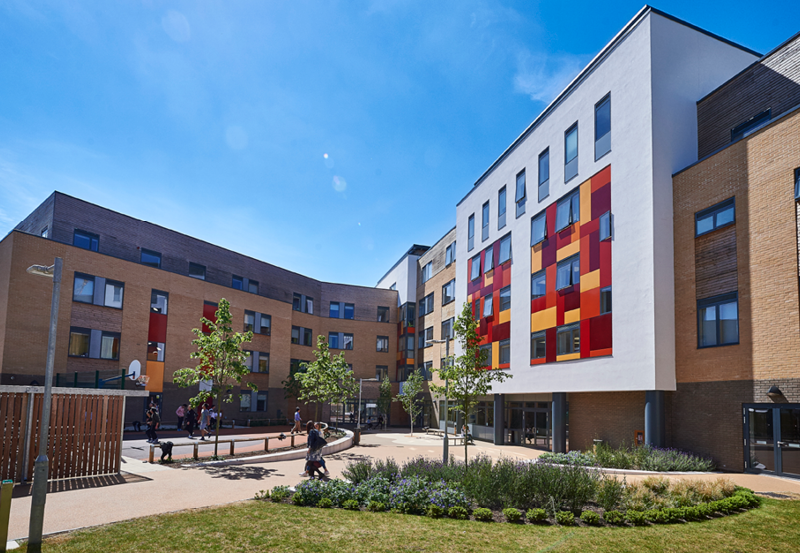Comparing the differences between the Polish and British Education Systems: A guide for Polish students planning to study in the UK
20th March 23
If you are a Polish student thinking about studying in the UK, we have prepared this introductory guide to studying in the UK and the differences (and similarities) between the Polish and UK education systems.

Key differences between the Polish and UK education systems
The Polish and UK education systems have some differences in terms of their structure, curriculum, and assessment methods. Here are some key differences:
Structure
In Poland, the education system is divided into compulsory Primary Education (for 8 years in grades 1-3 and 4-8 from age 7 to 15) and then Secondary Education (from age 16). Secondary Education in Poland is not compulsory and can last between 2 to 5 years depending on whether you attend a general secondary school (4 years), technical secondary school (5 years) or vocational school (2 or 3 years). To enter tertiary (higher) education, students pass the Maturity Certificate (Matura) (świadectwo maturalne) in a general secondary school.
In the UK, the education system is divided into Primary (age 5-11 years), Secondary (11-16 years) and college/sixth form (16+ years). Compulsory education is until the age of 16. At the end of each stage, national tests/exams are taken – SATS at the end of Primary, GCSEs at the end of Secondary and A Level, BTEC or IB at the end of college/sixth form which enable a student to access higher education.
Curriculum
In Poland, the curriculum is set by the Ministry of National Education and is largely standardised across the country. In the UK, schools have more autonomy in setting their own curriculum.
Assessment
All polish students have an obligatory exam at the end of primary school. At the end of Secondary Education, students who wish to continue their education at the tertiary level will sit the Matura (egzamin maturalny) in a general secondary school at the age of 18. For those who wish to obtain/ confirm a vocational qualification they will sit a vocational examination called egzamin zawodowy; In the UK, students take a selection of exams at the end of secondary school (GCSEs) and at the end of college/sixth form they will sit exams for A-levels and IB or achieve vocational qualifications.
Language
The language of instruction in Polish schools is primarily Polish, although some schools may offer classes in other languages. In the UK, the language of instruction is primarily English, although there are some Welsh and Scottish Gaelic medium schools.
Funding
In Poland, the education system is primarily funded by the government, while in the UK, schools receive funding from both the government and private sources.

What is an Independent School in the UK?
The Abbey DLD Group of Colleges are classed as independent schools. British Independent schools are schools that charge pupils a fee to study there, rather than being funded by the British Government. Independent Schools are also commonly known as ‘private’ or ‘public’ schools. Government funded schools provide free education to British students and are commonly referred to as ‘state’ schools. All schools in the UK are regulated and inspected, either by the British Government or a government-approved body such as the Independent Schools Inspectorate (ISI).
Unless they have a British passport or permanent resident status, Polish students will not be able access free ‘state’ education, so most Polish students will need to apply to an independent school for their GCSE or A Level studies. It is important to note that many British families will choose to send their children to fee-paying independent schools despite the availability of free state-funded schools.
What is a Boarding School in the UK?
Unless they have family or friends to live with in the UK, Polish students, like most international students, will need to study at a boarding school. A boarding school is a school where pupils study and live during term time. The ability to board on-site is one of the most attractive features to Polish students and their families, as the school will provide pastoral care, social, sporting and academic ‘extra-curricular’ activities, and basic necessities such as meals, utilities, and laundry for the students outside of the main school teaching hours.
Comparing UK and Polish Educational Stages
| Age | British Education | Polish Education equivalent | ||
| 13-14 | Year 9 | Grade 8 | ||
| 14-15 | Year 10 | GCSE | Grade 9 | Lyceum |
| 15-16 | Year 11 | Grade 10 | ||
| 16-17 | Year 12 | A Level | Grade 11 | |
| 17-18 | Year 13 | Grade 12 – Polish Matura | ||
For guidance, Year 11 is equivalent to the first two years of general secondary education in Poland. A Levels are equivalent to Grades 11 & 12 of the Polish Matura.
Compulsory Education Certification – Polish Primary School vs UK GCSE (Years 10 & 11)
There are differences between the certification achieved at the end of compulsory school education in Poland and the UK. Here are some points of comparison:
Age range
Polish Primary school is for students aged 7-15 with Stage II lower secondary education (age 11 to 15) covering grades IV to VIII, while English secondary school is for students age 11 to 16 with Years 10 and 11 (age 14 to 16) covering the GCSE examination courses. (Occasionally these courses begin in Year 9, age 13.)
Length of study
Polish Primary School is an 8 year program with Stage II lower secondary education covering the last 4 years, while UK secondary schools are for 5 years and the GCSEs in Years 10 and 11 is a two-year program. (Very occasionally a three year programme from age 13.)
Curriculum
Polish Stage II Primary Stage II lower secondary education students study a core curriculum of subjects including Polish, mathematics, foreign languages, history, and geography, as well as optional subjects such as art, music, or physical education. In the UK, Year 10 and 11 students study a core curriculum that includes English, mathematics, science, and a range of other subjects including Technology, Business, the Arts and Humanities.
Examinations
In Poland, eighth grade students take an exam at the end of Primary Education (eighth-grader exam) that determines their eligibility to continue on to general secondary school. In the UK, Year 10 students may take some exams, such as mock GCSE exams or a one year GCSE programme, but the main exams are taken at the end of Year 11.
Focus
In Polish primary school, the focus is on providing a broad and comprehensive education that prepares students for further study. In the UK, the focus in Years 10 and 11 is on preparing students for their GCSE exams, although students may also begin to explore vocational education or apprenticeships at this stage.
Overall, the main differences between Polish primary school and UK secondary school lies in the age range, length, and focus of the programs. While both provide a core curriculum of subjects, the specific subjects and the level of specialisation may differ. Additionally, the Polish primary school system places greater emphasis on preparing students for further study, while the UK Year 10 and 11 system places greater emphasis on preparing students for their GCSE exams.

Polish General Secondary vs UK A Level
Polish general secondary school and UK A Levels are both advanced levels of secondary education that prepare students for higher education. Here are some points of comparison:
Age range
Polish general secondary school typically starts at age 15 and ends at age 19, while A Levels are usually taken by students aged 16-18.
Length of study
Polish secondary school is a 4-year program, while A Levels are usually a 2-year program.
Curriculum
In Polish general secondary school, students study a core curriculum of subjects such as Polish, mathematics, and foreign languages, as well as specialised subjects in a chosen profile (humanities, sciences, etc.). In the UK, in addition to A Levels in core subjects such as mathematics and English, students can also choose from a wide range of elective subjects.
Examinations
In Poland, students take a standardised exam and obtain a maturity certificate (świadectwo maturalne) or Matura at the end of general secondary school, which includes written and oral components and determines their eligibility for higher education. In the UK, students take A Level exams in their chosen subjects, which are also used to determine their eligibility for higher education.
Focus
In Polish general secondary school, the focus is primarily on preparing students for higher education. In the UK, the focus on A Levels is on preparing students for higher education, although A Levels are also recognised for employment purposes.
Overall, Polish general secondary school and UK A Levels are similar in that they both provide advanced levels of secondary education and prepare students for higher education. However, they differ in terms of age range, length, curriculum, exams, and focus. A Levels offer greater flexibility in the choice of elective subjects, while the Polish system provides a more structured curriculum with specialised subjects in a chosen profile. The Matura exam in Poland is more standardised, while A Levels offer more variety in assessment methods.

Comparing University studies in Poland and the UK
Polish university studies and UK university studies are both higher education programs that aim to provide students with advanced knowledge and skills in their chosen field. Here are some points of comparison:
Length of study
In Poland, most bachelor’s degree programs last for 3 years, while in the UK they typically last for 3-4 years. Master’s degree programs in Poland last for 1-2 years, while in the UK they typically last for 1 year.
Curriculum
The structure of degree programs in Poland and the UK is similar, with a mix of lectures, seminars, and independent study. However, there may be differences in the specific subjects offered, depending on the university and the field of study.
Teaching style
In Poland, the teaching style tends to be more lecture-based, with a focus on theoretical knowledge. In the UK, there is more emphasis on independent study, group work, and practical application of knowledge.
Assessment
Both Polish and UK universities use a range of assessment methods, including exams, essays, coursework, and presentations. However, there may be differences in the weighting and frequency of different types of assessments.
Degree classification
In the UK, students are awarded a degree classification based on their final grades, ranging from First Class Honours to Third Class Honours or a Pass degree. In Poland, students receive a grade point average (GPA) based on their grades throughout the program.
Cost
In Poland, tuition fees for Polish citizens are significantly lower than for international students. In the UK, tuition fees for both UK and international students can be quite high.
Overall, Polish and UK university studies have many similarities in terms of structure, curriculum, and assessment methods. However, there may be differences in teaching style, degree classification, and cost. Both offer high-quality education and opportunities for students to develop their knowledge and skills in their chosen field.
Polish Student Case Study, Wojciech

‘‘My time in the UK was a great experience that provided me with exciting new opportunities. Playing football while studying taught me how to manage my time effectively, and how to study in my own time outside the classroom. The education I received here also allowed me how to pursue a degree at my dream university.
While living in the UK, I made many lifelong friends and enjoyed discovering everything the city has to offer. If I could share some advice with anyone thinking of enrolling at a British school, it would be to join without hesitation.”
Wojciech is now studying Politics and International Relations at the University of Nottingham.
Blog Author

Peggy Lardot
Senior Regional Manager, UK & Europe, Abbey DLD Group of Colleges
E: Peggy.Lardot@abbeydld.co.uk
T: +44 (0)7585 308324
Want to learn more?
The Abbey DLD Group of Colleges consists of three independent sixth-form colleges located in Cambridge, London and Manchester. We offer GCSE, A-Level, BTEC, Foundation, Preparation, and Combined Studies Programmes. Since 1931 the Abbey DLD Group has been synonymous with premium quality education, top university destinations, and enriching student experiences.
We hope that you found this blog post useful, if interested in studying at the Abbey DLD Group of Colleges and would like to learn more, simply complete the form below and a member of our admissions team will be in touch with you shortly.
Get in touch today



